Renting AI Is Dead — It’s Time to Own Your Digital Brain
🧠 Your AI Doesn’t Belong to You — But It Should
Let’s get this straight: if your AI can be shut down, censored, or changed without your permission — you don’t own it.
Right now, most of us are renting intelligence from centralized giants. ChatGPT, Gemini, Claude — great tools, but they come with strings attached. Corporate terms, server-side control, data mining you didn’t sign up for. If they change the rules? Too bad. You’re just a tenant in their black box.
Welcome to the era of rented intelligence.
🚨 Why This Should Freak You Out
Imagine trusting your AI with:
- Finances
- Health records
- Business ops
- Smart home control
...and one day, it just stops working. Or worse — it starts working against you.
This is the risk of centralized AI. You’re not in charge. You’re the product.
🔐 Enter: User-Owned AI (The Self-Custody Revolution)
User-owned AI flips the script.
Like holding your own crypto keys, you own the agent, its memory, logic, training data — everything.
No middlemen. No API throttling. No EULAs written in legalese.
Platforms like Pearl are building self-custodial agents that live where you want — local devices, private cloud, even offline. They’re customizable, portable, and loyal to only one master: you.
Think DeFi, but for intelligence.
Think MetaMask, but it talks back.
🤳 Huawei’s Eyewear Hints at the Future — But Misses the Mark
Let’s talk hardware. Huawei recently launched its Eyewear 2 Titanium Edition — AI-powered smart glasses with voice assistants, gesture control, even real-time translation.
Cool? Definitely.
Owned? Absolutely not.
If the AI inside is hardwired to a centralized service, your slick titanium shades are just another surveillance node. And that’s the point: hardware isn’t enough without ownership.
🔥 Why This Matters More Than Ever
As AI creeps into your emails, your car, your conversations, the stakes go up:
- 🧬 Data privacy = digital freedom
- 📉 Centralized failure = single point of control
- 🧠 AI memory = the next version of your identity
Ownership isn’t just a technical upgrade. It’s a civil right in the age of algorithms.
💡 What’s Next?
- Pearl-style agents running locally or on your terms
- On-chain AI identities with user-governed behavior
- Open-source autonomy instead of rented SaaS tools
- Crypto meets AI, where logic and liquidity are yours
The future of AI is not SaaS. It’s self-sovereign.
✅ TL;DR
- Rented AI is risky — you don’t control the rules or the data
- Pearl and similar platforms offer user-owned AI agents
- Huawei’s smart eyewear shows where we’re headed — but without self-custody, it’s just a fancy front-end
- If crypto taught us to own our money, AI should teach us to own our minds
Ready to unplug from the AI landlord?
Time to own your digital brain.
🧩 Learn more: pearl.ai
💬 Join the movement: [Telegram] | [Lens] | [X]

Recent News
All Time High • Live
Have questions or want to collaborate? Reach us at: [email protected]










